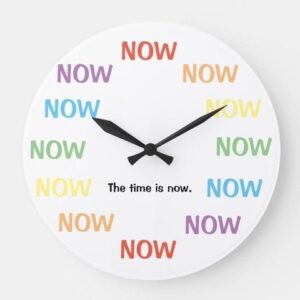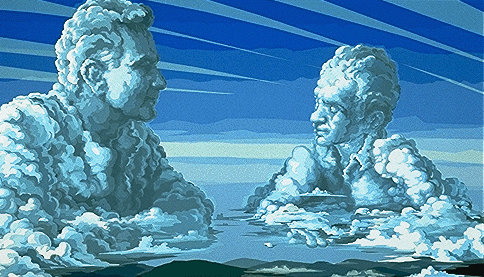There’s No Time Like the Present
“There’s no time like the present,” my new student says to me as she rushes off to pack her car after meditation on the last day of our retreat. She’s joined by a couple of other super-achievers who are intent on taking advantage of the few minutes before breakfast to get everything buttoned up. They’ve checked meditation off the to-do list, and now they’re in closing-up mode, determined to get it done before going to eat.
The rest of us move more slowly, heading down to the dining hall, feeling the poignancy that still lingers after the meditation. There’s an allowing of the moment, and as we collect our food and sit with each other for this last meal, there’s a brilliance to everything.
![]() My eye meets the eye of another student, and that glance is overflowing with meaning. It tells of an awareness beyond these physical forms, like the moment in the movie Avatar, where Neytiri says to Jake, “I see you,” or like the “Holy Moment” from the movie Waking Life, where a conversation’s focus shifts from the content of what’s being said to the stillness behind the words. Seeing is happening, and being together is happening, right here, right now. These are the moments that make you know why you’re alive, what the point is to all of this.
My eye meets the eye of another student, and that glance is overflowing with meaning. It tells of an awareness beyond these physical forms, like the moment in the movie Avatar, where Neytiri says to Jake, “I see you,” or like the “Holy Moment” from the movie Waking Life, where a conversation’s focus shifts from the content of what’s being said to the stillness behind the words. Seeing is happening, and being together is happening, right here, right now. These are the moments that make you know why you’re alive, what the point is to all of this.
Rushing past the moment
My new student’s drive to get everything done efficiently and in record time is a highly functional and rewarded behavior pattern in our society, and yet it deprives her of a kind of sustenance that can’t be found in all that rushing and achieving. When we’re not trying to push things, make them move forward faster, and get onto what happens next, there’s an entirely different quality of existence available to us—one that’s capable of effortlessly delivering the meaning we’re so busy seeking with all our busyness.
 I know, because I’ve been there. I still struggle from time to time with this overachiever, let’s-get-it-done-NOW pushiness. It seems so sensible, so obviously “the right thing to do,” and I lived much of my early adulthood in this flurry of doing. It created tons of adrenaline, and made me feel as though I was really effective. It took me quite a few years, working with a series of spiritual teachers, to see that this behavior pattern was completely locking me out of any greater awareness of what’s really going on here. What I’d taken to be effectiveness was really only the ability to do a lot of things really fast—things that often didn’t need to be done in the first place. Because I was so busy doing them, though, I never took the time to look at whether this was the most effective use of my time and energy. I thought I knew already what that was, and I thought the point was productivity, which required constant activity.
I know, because I’ve been there. I still struggle from time to time with this overachiever, let’s-get-it-done-NOW pushiness. It seems so sensible, so obviously “the right thing to do,” and I lived much of my early adulthood in this flurry of doing. It created tons of adrenaline, and made me feel as though I was really effective. It took me quite a few years, working with a series of spiritual teachers, to see that this behavior pattern was completely locking me out of any greater awareness of what’s really going on here. What I’d taken to be effectiveness was really only the ability to do a lot of things really fast—things that often didn’t need to be done in the first place. Because I was so busy doing them, though, I never took the time to look at whether this was the most effective use of my time and energy. I thought I knew already what that was, and I thought the point was productivity, which required constant activity.
I had to get walloped by life more than a couple of times in order to recognize that this is not the point of being here on Earth. While I was so busy achieving, there was something vastly more profound and fulfilling happening all around me, every moment of every day. I just had to slow down enough to experience it firsthand.
Missing the point
To start with, when my teachers presented me with opportunities for engaging something with presence, I didn’t get it. I remember one time in particular when I had been asked to assist in laying out a labyrinth. I saw the pattern on paper, grasped how to translate that onto the ground in front of us, and set about plowing into the task by myself as though it were a speed test. “Stop!” my teacher demanded.
“Why?” I exclaimed internally. “I’m on a roll! Get out of my way! Don’t you understand that I’m an architect and I know how to do this? I don’t need help. I just need to clear the decks so I can lay this out without interference from people who don’t really get it.” But he was having none of it. Stop meant stop, and I knew enough to stand down, even if not willingly. So I just stood there, frustrated. He let me continue only after I had calmed down, and was willing to allow the other students to join me in collectively shaping the labyrinth. I discovered that day that the point was not the perfection of the labyrinth, but the making of it, together. His fierce intervention mystified me for years, as any truly effective teaching can do. I didn’t understand what I was doing wrong, or what I was missing with my pushiness.
 For me, at that time, anything worth doing had to be exciting, produce an adrenaline rush, and have some obvious meaning and purpose. The labyrinth had meaning and purpose, all right—it would allow all the students present to have the experience of walking its circuitous path to the center and back in presence (ironically enough!)—but for it to be exciting, I had to generate adrenaline by moving fast, and that meant pushing everyone else out of the way so the speed would be unimpeded. I couldn’t have seen this habitual pattern of missing the moment, missing the engagement with others, missing what was actually happening, until I received the “Stop!” wallop from my teacher.
For me, at that time, anything worth doing had to be exciting, produce an adrenaline rush, and have some obvious meaning and purpose. The labyrinth had meaning and purpose, all right—it would allow all the students present to have the experience of walking its circuitous path to the center and back in presence (ironically enough!)—but for it to be exciting, I had to generate adrenaline by moving fast, and that meant pushing everyone else out of the way so the speed would be unimpeded. I couldn’t have seen this habitual pattern of missing the moment, missing the engagement with others, missing what was actually happening, until I received the “Stop!” wallop from my teacher.
Ordinary profundity
What I eventually discovered by confronting the belief that I had to always be busy, always be pressing forward with that “no time like the present” attitude, is that there’s extraordinary beauty in the ordinary and mundane when we learn how to show up completely. The only thing that makes it ordinary, in fact, is a mind that’s comparing it to what’s happened before, and declaring it to be dull. When that insatiable do-er is offline though—which occurs when one is not planning what’s going to get done next, and not thinking about how to get everything crammed into the available time frame, but is simply there and completely engaged in whatever is actually happening—the ordinary becomes profoundly meaningful. That’s what was happening at that last meal at the retreat, and everyone present knew it.

The “Holy Moment” from Waking Life
There’s a quotation from 13th-century Zen Master Dogen that says it best: We were experiencing “the ordinary profundity of the present moment becoming the present moment.” Sitting with each other in the dining hall, as we had done so many times before, in that moment of holiness, that moment of being with each other completely, it suddenly occurred to me, “There truly is no time like the present.” But not the way my student or my earlier self would interpret the phrase. Those words don’t have to mean “Hurry up and do it now,” but can instead be an invitation to come into presence in this moment, even as we do what we’ve done a thousand times before. It may look the same on the surface, but this moment, and every moment, is an entirely new universe, brimming with holiness.



